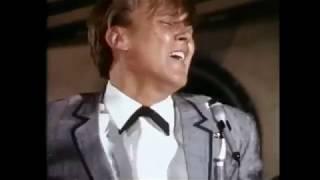The Falcons didn't start out as a pure rhythm and blues group, nor did they begin with only black members. The group was racially mixed and sang modern and pop R&B harmonizers with a touch of gospel. Bob Manardo and Eddie Floyd worked together in a Detroit jewelry store and decided to form a vocal group. Bob drafted his friend Tom Shetler and Eddie brought in Arnett Robinson.
A local street singer, Willie Schofield, made it a quintet that Arnett dubbed the Falcons. The group had no idea there were previous Falcons groups that recorded for Regent ("How Blind Can You Be," 1951), Savoy ("It's You I Miss," 1953), Flip ("Stay Mine," 1954), and Cash ("I Miss You Darling," 1955). The lineup read Floyd (lead), Manardo (first tenor), Robinson (second tenor), Shetler (baritone), and Schofield (bass). Manardo and Shetler were white and the others black.
This group surfaced years before the same racial combination showed up in THE DEL-VIKINGS and THE MARCELS. The group rehearsed incessantly and was very serious about their singing. Eddie introduced the Falcons to his uncle, Robert West, owner of the Lupine and Flick labels, who arranged a few bookings and signed them to Chicago's Mercury Records for one solid doo wop rocker in a CLEFTONES (Gee)/MOONLIGHTERS (Checker) style with a sax solo and a driving cha-cha beat, titled "Baby That's It
The group now began leaning more toward gospel and blues blended with modern. Singles with Kudo and Silhouette went nowhere so West finally decided to put them on his own Flick label. The first issue was a song written by Schofield, Finnie, and West that would initiate some changes in rhythm and blues music. Released in early 1959, "You're So Fine," with its raw, bouncy, funky, shuffle beat and Joe Stubbs's ough-edged vocal, took the public by storm. Flick made a quick deal with United Artists' Unart label for both the group and the release of the single.
Billboard's March 14th review gave it four stars, commenting, "The group comes through with the authentic church sound on this pulsating effort, sung with feeling by the strong lead with help from the group. It could grab coins."It did, charting number two R&B April 6th and number 17 Pop. Their next charter came from Chess Records, trying to capitalize on the Unart hit by repeating the title melody of "You're So Fine" in the chorus of "Just for Your Love" (#26 R&B, late 1959).
he group had a few sides on the Unart parent label, United Artists, making noise only with "The Teacher" (#18 R&B), with another strong Stubbs lead. Their last UA issue was "Working Man's Song." By now, Stubbs had left (later going on to sing on occasion with his brother Levi's group, THE FOUR TOPS, as well as the Contours and the Originals), replaced by a 19-year-old from Prattville, Alabama, named Wilson Pickett
He did the lead vocal on their 1962 hit "I Found a Love" (#75 Pop, #6 R&B), but before the year was over the group found West farming them out to another label (Atlantic) to further capitalize on the success he'd built.
None of the three Atlantic sides drew much interest and when Schofield was drafted in 1963, the group disbanded.
Robert West wasn't about to let the golden goose get cooked, however, so he took Carlis "Sonny" Monroe, Johnny Alvin, Frank Holt, and James Gibson, known collectively as the Fabulous Playboys, and made them the Falcons (5).
A local street singer, Willie Schofield, made it a quintet that Arnett dubbed the Falcons. The group had no idea there were previous Falcons groups that recorded for Regent ("How Blind Can You Be," 1951), Savoy ("It's You I Miss," 1953), Flip ("Stay Mine," 1954), and Cash ("I Miss You Darling," 1955). The lineup read Floyd (lead), Manardo (first tenor), Robinson (second tenor), Shetler (baritone), and Schofield (bass). Manardo and Shetler were white and the others black.
This group surfaced years before the same racial combination showed up in THE DEL-VIKINGS and THE MARCELS. The group rehearsed incessantly and was very serious about their singing. Eddie introduced the Falcons to his uncle, Robert West, owner of the Lupine and Flick labels, who arranged a few bookings and signed them to Chicago's Mercury Records for one solid doo wop rocker in a CLEFTONES (Gee)/MOONLIGHTERS (Checker) style with a sax solo and a driving cha-cha beat, titled "Baby That's It
The group now began leaning more toward gospel and blues blended with modern. Singles with Kudo and Silhouette went nowhere so West finally decided to put them on his own Flick label. The first issue was a song written by Schofield, Finnie, and West that would initiate some changes in rhythm and blues music. Released in early 1959, "You're So Fine," with its raw, bouncy, funky, shuffle beat and Joe Stubbs's ough-edged vocal, took the public by storm. Flick made a quick deal with United Artists' Unart label for both the group and the release of the single.
Billboard's March 14th review gave it four stars, commenting, "The group comes through with the authentic church sound on this pulsating effort, sung with feeling by the strong lead with help from the group. It could grab coins."It did, charting number two R&B April 6th and number 17 Pop. Their next charter came from Chess Records, trying to capitalize on the Unart hit by repeating the title melody of "You're So Fine" in the chorus of "Just for Your Love" (#26 R&B, late 1959).
he group had a few sides on the Unart parent label, United Artists, making noise only with "The Teacher" (#18 R&B), with another strong Stubbs lead. Their last UA issue was "Working Man's Song." By now, Stubbs had left (later going on to sing on occasion with his brother Levi's group, THE FOUR TOPS, as well as the Contours and the Originals), replaced by a 19-year-old from Prattville, Alabama, named Wilson Pickett
He did the lead vocal on their 1962 hit "I Found a Love" (#75 Pop, #6 R&B), but before the year was over the group found West farming them out to another label (Atlantic) to further capitalize on the success he'd built.
None of the three Atlantic sides drew much interest and when Schofield was drafted in 1963, the group disbanded.
Robert West wasn't about to let the golden goose get cooked, however, so he took Carlis "Sonny" Monroe, Johnny Alvin, Frank Holt, and James Gibson, known collectively as the Fabulous Playboys, and made them the Falcons (5).
- Category
- Oldies
Sign in or sign up to post comments.
Be the first to comment


